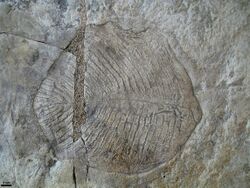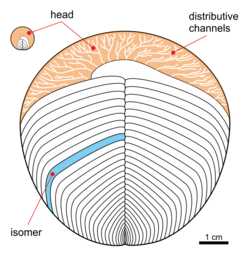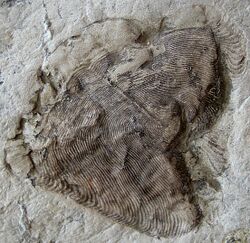Biology:Cephalozoa
| Cephalozoa | |
|---|---|

| |
| Fossil of Yorgia waggoneri, a cephalozoan found on the shores of the White Sea. | |
| Scientific classification | |
| Kingdom: | |
| Phylum: | |
| Class: | †Cephalozoa Fedonkin, 1985
|
| Subtaxa | |
Cephalozoa[1] are an extinct class of primitive segmented marine organisms within the Phylum Proarticulata from the Ediacaran period. They possessed bilateral symmetry and were characterized by a thin, rounded body.
Description
Unlike the other classes of proarticulates, the segmentation of the body is not complete and shows a "head" with fine distribution channels. Some species of the Yorgiidae family also show some asymmetry.[3][4][5]
They were discovered in Russia near the White Sea in the Arkhangelsk region, where they lived during the Ediacaran, approximately 635 to 540 Ma (millions of years ago).
Taxonomy
Cephalozoa includes the families Yorgiidae and Sprigginidae:
Yorgiidae
- † Archaeaspinus Ivantsov, 2007 (synonym of Archaeaspis)
- † Archaeaspinus fedonkini Ivantsov, 2001
- † Yorgia Ivantsov, 1999
- † Yorgia waggoneri Ivantsov, 1999
Sprigginidae
- † Spriggina Glaessner, 1958
- † Spriggina floundersi Glaessner, 1958
- † Spriggina ovata Glaessner and Wade, 1966 now considered synonym of Marywadea ovata.
- † Marywadea Glaessner, 1976
- † Marywadea ovata Glaessner and Wade, 1966
- † Cyanorus Ivantsov, 2004
- † Cyanorus singularis Ivantsov, 2004
- † Praecambridium Glaessner and Wade, 1966, previously classified as Yorgiidae; now considered a juvenile form of Spriggina[6]
- † Praecambridium sigillum Glaessner and Wade, 1966
The genus Andiva sometimes includes Cephalozoa:
- Andiva Fedonkin, 2002
- Andiva ivantsovi Fedonkin, 2002
Recent studies indicate that the family Yorgiidae could be included or closely related to the class Vendiamorpha.[7]
See also
References
- ↑ 1.0 1.1 Ivantsov, A. Y. (2001). "Vendia and Other Precambrian "Arthropods"" (in en). pp. 335–343. https://www.academia.edu/2605872/Vendia_and_Other_Precambrian_Arthropods_.
- ↑ Mikhail A. Fedonkin, James G. Gehling, Kathleen Grey, Guy M. Narbonne, and Patricia Vickers-Rich. Foreword by Arthur C. Clarke. (2008) "The Rise of Animals. Evolution and Diversification of the Kingdom Animalia"
- ↑ Ivantsov, A. Yu (2004). "New Proarticulata from the Vendian of the Arkhangel’sk Region" (in en) (PDF). pp. 247–253. http://vend.paleo.ru/pub/Ivantsov_2004_eng.pdf.
- ↑ Ivantsov, A. Y.; Malakhovskaya, Y. E. (2004). "Some Problematic Fossils from the Vendian of the Southeastern White Sea Region" (in en). pp. 1–9. http://www.vend.paleo.ru/pub/Ivantsov_et_al_2004_eng.pdf.
- ↑ Ivantsov, A. Y. (2004) "Vendian Animals in the Phylum Proarticulata" . The Rise and Fall of the Vendian Biota. IGSP Project 493. Abstracts. Prato, Italy, p. 52.
- ↑ Ivantsov, Andrey Yu (2007). "Small Vendian transversely Articulated fossils" (in en). pp. 113. doi:10.1134/S0031030107020013. https://www.academia.edu/2352394/Small_Vendian_transversely_Articulated_fossils.
- ↑ "Fossilworks: Vendiamorpha". http://www.fossilworks.org/cgi-bin/bridge.pl?a=taxonInfo&taxon_no=342808.
Wikidata ☰ Q30750018 entry
 |



